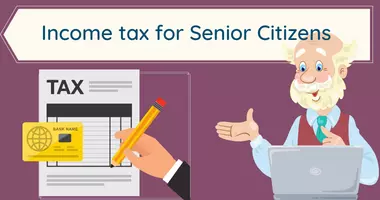Are you looking for income tax for senior citizens? Under Income Tax Act, 1961, senior citizens (aged 60 to below 80 years) get higher basic exemption limit of Rs. 300000. In this blog we discuss income tax rules, exemptions and benefits for senior citizens and pensioners and how pension income is taxed
Income tax for senior citizens
Income tax for senior citizens is calculated based on several components. Such as basic salary, fixed allowances, house rent allowances and other sources of income.
Many online income tax calculators are available on financial and government websites. To use these calculators, applicants need to enter details like assessment year, age and annual taxable income.
Do not include exempt retirement benefits like gratuity and provident fund while entering income details. Add TDS details, if applicable. People aged 60 to below 80 years are treated as senior citizens and get a basic tax exemption of up to Rs.300000.
Income Tax Slabs for Senior Citizens (60–80 Years)
| Income Range | Tax Rate |
|---|---|
| ₹0 – ₹300000 | Nil |
| ₹300001 – ₹500000 | 5% |
| ₹500001 – ₹1000000 | 20% |
| Above ₹1000000 | 30% |
Income tax benefits for Senior citizens
- Interest income:
Senior citizens can claim tax exemption up to Rs. 50000 on interest earned in financial year. This benefit is available under Section 80TTB.
The deduction applies to interest earned from: Bank savings accounts, Fixed deposits, Post office deposits
If total interest income exceeds Rs 50000 in financial year, banks may deduct TDS. To avoid TDS when total income is below basic exemption limit, senior citizens can submit Form 15H to bank.
- Advance tax:
Senior citizens who do not have income from business or profession are not required to pay advance tax. They only need to pay self assessment tax after calculating total tax liability for financial year.
- Reverse mortgage:
Senior citizens can use value of their residential property to receive regular payments under reverse mortgage scheme. This scheme allows them to convert property value into regular source of income.
Under reverse mortgage, property is mortgaged to bank or financial institution in return for periodic payments, which helps support retirement income. Amount received through reverse mortgage is not taxable.
Is pension taxable for senior citizens
Yes, pension income for senior citizens is taxable and must be reported in Income Tax Return under Salary. Pension is usually paid monthly, but you can also choose to receive it as a lump sum rather than regular payment.
- Commuted and Uncommuted Pension
In most cases, both employer and employee contribute to pension or annuity fund, from which the pension is paid after retirement. At the time of retirement, employee may choose to receive portion of pension in advance. This advance portion is known as commuted pension.
- Pension received by Family Member
A family member’s pension is taxed under the heading “income from other sources on his or her income tax return.”
This pension is not taxable if it is commuted or paid in a lump sum amount.
A family member is uncommuted pension and is exempted to certain extent. Exemption from tax is limited to Rs. 15,000 or 1/3rd of uncommuted pension is received, whichever is smaller.
How to report pension income and employer details in tax return
When filing your ITR, pension income is reported under Salary Schedule.
- In the Income Tax Return (ITR), go to Salary Schedule.
- In the field Nature of Employment, select Pensioners.
- Enter taxable pension income under Salary.
- Provide employer details like: Employer name, employer address, TAN (Tax Deduction and Collection Account Number), TDS deducted
- Any portion of pension that is tax-free should be treated as Commuted Pension.
Commuted Pension (tax‑free portion):
- If portion of the pension is received as lump sum, tax-free part should be reported under Schedule: Exempt Income.
- Select Any Other under Nature of Exempt Income
- In the description, mention “Commuted Pension under Section 10(10A)”
- Enter the exempt amount
Annuity / Uncommuted Pension (monthly):
- Regular monthly pension is fully taxable.
- Report this amount under Gross Salary
- Taxable as per Section 17(1) of Income Tax Act
Income tax filing for senior citizens and pensioners
Senior citizens and pensioners must file Income Tax Return to report income and claim any eligible tax refund. Based on income sources, the following ITR forms apply:
ITR I – Individuals whose total income includes:
- Salary or pension income
- Income from one house property (no carried-forward loss)
- Income from other sources such as interest (excluding lottery or horse-racing income)
ITR 2 – Individuals whose total income includes:
- Salary or pension income
- Income from house property (including more than one property)
- Capital gains
- Income from other sources, including lottery or horse-racing winnings
- Income of another person (such as spouse or minor child) that is required to be clubbed
Choosing the right ITR form helps you avoid mistakes and makes sure your tax return is processed smoothly





Leave a Reply